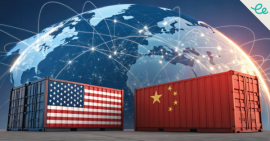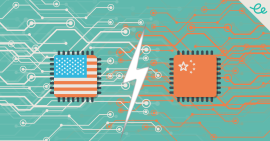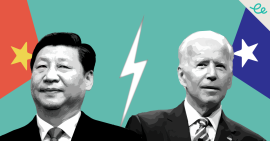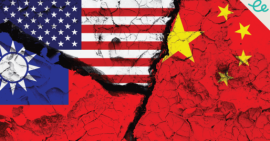Amid swirl of high-profile visits, Xi and Putin plot new world order
China isn’t in the G7 club. But the PRC was firmly on the agenda when G7 foreign ministers met in Tokyo last week. They addressed “challenges to the rules-based international order that underpins stability” in the Indo-Pacific and worldwide, according to US Secretary of State Antony Blinken.
No prizes for guessing he meant Beijing’s actions towards Taiwan, the hotspot at the heart of the troubled US-China relationship. From April 8, China held three days of military exercises around Taiwan, simulating targeted strikes and a blockade of the island. The drills came in response to the April 5th meeting between Taiwan’s President Tsai Ing-wen and US House Speaker Kevin McCarthy.
Despite grave warnings from China’s government, Tsai met McCarthy and a bipartisan group of Congress members at the Ronald Reagan Presidential Library in California. Last August, China reacted with massive war games when Tsai met his predecessor in Taiwan. The quasi-blockade showed off Beijing’s growing capacity to isolate Taipei from outside help.
Tsai highlighted Reagan’s belief that “to preserve peace, we must be strong”, adding “we are stronger when we are together…Taiwan was grateful to have the US by its side.” Calling Tsai “a great friend to America,” McCarthy said they would “find ways for the people of America and Taiwan to work together to promote economic freedom, democracy, peace and stability in Asia.” China accuses the US and Tsai of provoking instability.
The US has increased engagement with Taiwan in recent years, even as Beijing succeeds in isolating Taipei diplomatically. Tsai transited twice through the US en route to a Central America tour of Belize and Guatemala. Honduras was off limits – it just switched allegiance to China, leaving Taiwan with only 13 formal allies. Beijing now counts 182.
But even without official relations, the US remains Taiwan’s key ally, and its leader knows the buttons to press. “Taiwan stands on the front lines of democracy,” Tsai said in New York on March 30. “We will work hand in hand with our democratic partners.” She promised the island would not be isolated despite the “enormous challenges” it faced.
Duelling Visits
Tsai’s US stopovers coincided with the controversial trip to mainland China by former president Ma Ying-jeou. Ma became the first Taiwanese leader, former or current, to visit China since the end of the Chinese Civil War in 1949. A KMT heavyweight, Ma hopes Taiwanese voters, at January’s elections, will see the opposition KMT as the only party capable of defusing the threat of Chinese invasion.
Tsai’s ruling DPP accuses Ma of capitulating to Beijing and encouraging China’s plans for “reunification”, peaceful or otherwise. Their simultaneous visits, and opposing visions, underscore “the increasing precariousness of peace on the democratically ruled island, and the uncertain path to maintaining it”, wrote Stephanie Yang in the LA Times.
For months, the US had hoped to put a floor under deteriorating ties with China, but the spy balloon incident in February put paid to those hopes. China is still refusing to let Blinken visit Beijing over concerns that the FBI will release results of an investigation into the downed balloon, the FT reported on April 15.
The US and China are talking past each other, and failing to respond to each other’s sensitivities, Nigel Inkster, Enodo Director of Geopolitical and Intelligence Analysis, told our webinar “The High-Stakes Global Chess Game”, in March. “The US and allies are engaged in an exercise in deterrence, hoping that China will be discouraged from any extreme behaviour such as actually launching an invasion against Taiwan, but in effect we’re now seeing the two sides engaged in a very high-stakes poker game.”
To Russia with love
For his first foreign trip after “re-election” as President, the least powerful of his three titles, Xi Jinping chose to visit Moscow (March 20-22) and “best friend” Vladimir Putin. The pair ignored the International Criminal Court’s arrest warrant for the Russian leader. Their public statements focused on strengthening their solidarity as two superpowers aligned in countering American dominance and a Western-led world order.
“China fundamentally is not really interested in Ukraine, and looks at the conflict through the lens of its own preoccupations, mainly Taiwan,” said Inkster, as Beijing expects Russian support for any military action against the island. “China doesn’t want to see a Russia that is permanently isolated, impoverished and diminished in global status, as China sees Russia as a key partner in efforts to reset the international global governance system.”
Beijing issued an underwhelming peace proposal for Ukraine, ahead of Xi’s trip. But the intervention should not be completely dismissed – Ukraine’s President gave a cautious welcome, hoping Beijing was interested in a “fair peace”, which means not “supplying weapons to Russia”.
Make love, not war
China’s (unlikely) role as peace broker was boosted by hosting talks between long-time rivals Saudi Arabia and Iran that produced a diplomatic coup on March 10: agreement to reopen diplomatic relations. Xi followed up by calling for China to play a bigger role in managing global affairs. Top Saudi and Iranian envoys met in Beijing on April 6 and vowed to bring “stability” to the Middle East.
Biden may remain blocked (for now), but also in China’s capital this month were French President Emmanuel Macron, European Commission President Ursula von der Leyen, and German foreign minister Annalena Baerbock. Macron failed to talk Xi into changing his stance on Ukraine, and drew criticism for calling on Europe to develop a stance independent of the US in navigating tensions between Beijing and Taiwan. Lest Beijing think Macron’s views represent EU policy, Baerbock reasserted European concerns about Taiwan.
China’s new Premier Li Qiang spoke to Russian counterpart Mikhail Mishustin on April 4, calling on both sides to deepen “practical cooperation”. China’s new Defence Minister Li Shangfu, who is sanctioned by the US, met Putin in Moscow on April 16. The pair hailed close bilateral military cooperation. But Enodo doubts China will, for now, cross the US red line of arming Russia to help defeat Ukraine.
In California, President Tsai reiterated Taiwan’s commitment to defending the “peaceful status quo” that Washington hopes both sides of the Taiwan Strait can maintain. This latest high-level US engagement with Taiwan sparked war games that were on a par with those conducted last August. More broadly, China is weighing how to counter the US moves that have reinvigorated alliances in the Indo-Pacific over the past 18 months.
Under the AUKUS deal, Australia will get a fleet of nuclear subs and a wide range of other advanced military tech. Japan is set to double its defence budget in five years and pursue counter-strike capabilities. The Philippines is giving the US army access to four new military bases, including one close to Taiwan. Manila is “stoking the fire” of Taiwan tensions, warned China’s ambassador.
The geopolitical game – poker, chess or however you frame it – bears close watching. The consequences could be far worse than a loser’s wounded pride.
If you want to learn more about the most important bilateral relationship in the world, check out our training course on the topic.
Related articles:
Taiwan still the flashpoint for US-China relations, as Biden still awaits face time with Xi
Pelosi’s Flying Visit to Taiwan Sends US China Relations into Tailspin
Sharpen those quills: US sells “porcupine” Taiwan $19bn of arms (2017-2022) (Infographic)








